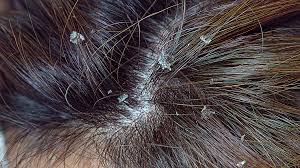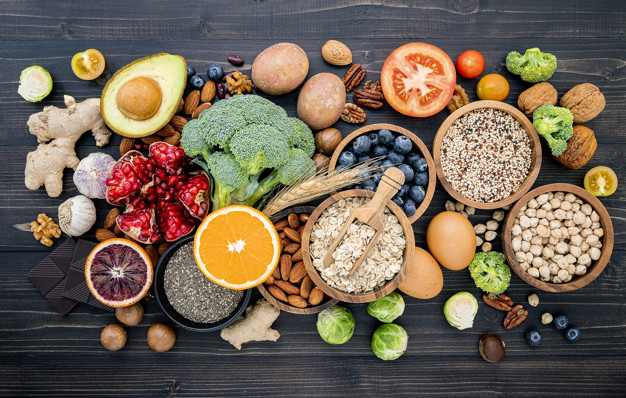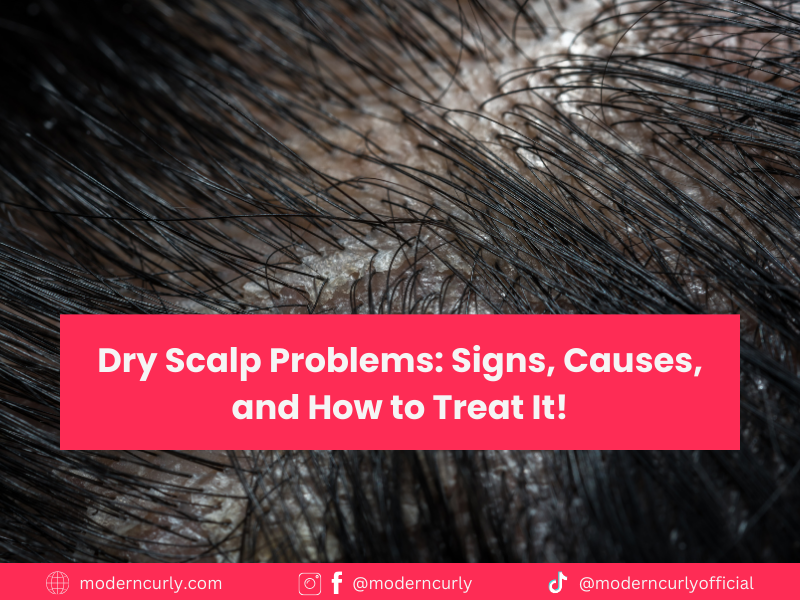How To Take Care of Dry Scalp for Curly Hair
Dealing with a dry scalp can be particularly challenging for those with curly hair. The natural twists and turns of curls can make it difficult for the scalp’s natural oils to travel down the hair shaft, leaving both the scalp and hair dry. Understanding how to properly care for a dry scalp while maintaining the health and beauty of your curls is essential. In this guide, we’ll explore effective strategies and tips to help you combat dryness and keep your curls looking their best.
What Is Dry Scalp?
Dry scalp is a common issue that can make your skin feel tight and itchy. It often happens when your scalp lacks enough moisture. This condition can cause your scalp to flake, which might look like dandruff. However, unlike dandruff, dry scalp flakes are usually smaller and whiter. Symptoms of dry scalp includes itching, tightness and flakiness.

What Causes A Dry Scalp?
A dry scalp can be frustrating, especially if you have curly hair. It can be caused by internal factors such as genetics or health conditions, as well as external factors like weather and hair care routines.
1. Internal Causes
Genetics play a big role in your scalp health. Some people naturally produce less sebum, the oil that keeps your scalp moisturized. This can lead to dryness more easily. Health conditions like eczema or psoriasis may also contribute to dryness.
Diet impacts your scalp too. Lacking enough vitamins, especially vitamins E and D, may lead to dryness. Staying hydrated is important, as dehydration can make your scalp feel dry and itchy. Keeping a balanced diet supports overall scalp health.
2. External and Environmental Causes
Weather can greatly affect your scalp. Cold and dry climates often strip away natural oils, leaving your scalp dry. Spending too much time in the sun can also dry out your scalp.
Hair care routines matter too. Over-washing your hair can remove essential oils. Using harsh hair products, especially those with sulfates, can exacerbate the problem. It’s best to use gentle, moisturizing products specifically designed for curly hair.
Heaters during winter months can make indoor air dry, impacting your scalp. Adding a humidifier to your space can help maintain moisture levels. Be mindful of how different external elements contribute to a dry scalp, and adjust accordingly for a healthier routine.
Aside from those, over-washing your hair could also be the cause of dry scalp.
Why Do People With Curls Often Have A Dry Scalp?
Dry scalp is a common issue for those with curly hair. Curly hair tends to be more porous, which can lead to moisture loss. The natural oils produced by your scalp, called sebum, find it harder to travel down your curls. This results in a scalp that lacks moisture, leaving it flaky and itchy.
Moisture loss isn’t just about your hair type. It can also be affected by your daily routine. For instance, using hot styling tools or harsh hair products can strip away natural oils. Consider opting for a moisturizing conditioner or using a deep-conditioning treatment to protect your scalp.
Read Also: All Hair Problems Every Men Hate (Yes, Hate!)
Environmental factors can also play a role. Dry air, especially during winter, can make a dry scalp worse. Humidity can help moisture in curls, but when it’s dry outside, your scalp can feel the effect. Covering your hair with a stylish hat or headscarf can help retain moisture and add a fun touch to your wardrobe.
The Difference Between Dry Scalp VS Dandruff
Dry scalp and dandruff may seem similar, but they are different issues affecting your hair. Dry scalp occurs when your skin lacks moisture. It may lead you to feel itchy and tiny flakes may appear.
Dandruff, on the other hand, results from excess oil causing skin cells to build up and shed. Unlike a dry scalp, dandruff involves larger, oily flakes that can stick to your hair and clothes.
| Feature | Dry Scalp | Dandruff |
| Cause | Lack of moisture | Excess oil production |
| Flake Type | Small, dry flakes | Larger, oily flakes |
| Symptoms | Itchy scalp | Itchy, flaky scalp |
When your curly hair experiences these issues, it’s important to identify which one you’re dealing with. Tackle dry scalp by using gentle shampoos or moisturizing treatments. If dandruff is the issue, a specialized dandruff shampoo can help.
Try to identify skin conditions beyond dry scalp, as curly hair requires special care. Regular moisturizing prevents dry scalp, while treatments for dandruff involve anti-fungal shampoos or ingredients like tea tree oil.
Remember to stay hydrated and maintain a balanced diet to promote healthy hair and scalp. Seasons or stress levels can affect these conditions, so pay attention to any changes that occur in your routine.
Treating and Preventing Dry Scalp
Dealing with a dry scalp, especially with curly hair, involves focusing on the right cleansing routine, understanding the ingredients in hair products, and addressing possible nutritional or hormonal issues. Making these adjustments can improve your scalp health and hair’s natural beauty.
1. Change Your Cleansing Routine
Switching up how often and how you wash your hair can make a difference. Curly hair retains moisture differently, so frequent washing can strip its natural oils. Try washing your curls less often—perhaps twice a week—using a gentle shampoo for dry scalp and curly hair.
Consider these tips:
- Use lukewarm water.
- Rinse thoroughly to remove all product.
- Limit shampooing to your scalp only.
Remember, a healthy scalp could lead to healthier curls.
2. Mind Your Hair Products’ Ingredients

The right products make a significant impact. Ingredients like sulfates and parabens can worsen dryness. Look for shampoos and conditioners free from these harsh chemicals. Instead, choose products with natural oils such as argan oil or coconut oil. They hydrate and nourish your scalp without causing irritation.
Be mindful of itching or flaking after using a new product—that’s a sign it may not suit you. Reading labels carefully helps ensure you’re choosing hair-friendly options.
3. Correct Nutritional and Hormonal Imbalances

Sometimes, dry scalp is linked to what you eat or hormonal changes. A balanced diet rich in essential fatty acids can support scalp health. Omega-3 fatty acids found in fish or flax seeds are great options.
Additionally, consider whether recent changes in medication or lifestyle could be affecting your hormones. Consulting a healthcare provider can guide you if you suspect any imbalances. Remember, feeling good inside can reflect on the outside, making your curls shine with health.
4. Deep Conditioning Treatment
Apply a nourishing hair mask once a week. Look for ingredients like avocado oil, argan oil, or shea butter. Consider trying a scalp massage. Massage gently using your fingertips. This improves blood flow and helps in spreading natural oils. Adding a few drops of tea tree oil can be very refreshing.
5. Boost Circulation With Scalp Massager
Enhance blood flow by using a scalp massager regularly. This tool helps distribute natural oils and relaxes your scalp muscles. Applying gentle pressure in circular motions can stimulate your scalp. Use it weekly to see improvement. A scalp massager provides a self-care moment that feels amazing while working. It’s affordable and easy to use. Incorporate it into your hair-care routine to rejuvenate tired scalps.
6. Don’t Overwash
Over washing strips away natural oils, leading to a dryer scalp. Set a balanced washing schedule based on your hair type. Curly hair, especially, may not need frequent washing. Depending on your routine, washing once a week or every few days might be suitable.
Adjust your cleansing routine with the seasons. During winter, consider washing less often to keep your scalp from drying out. This balance maintains healthier hair and scalp.
7. Drink Lots Of Water
Hydration starts from the inside and helps to combat a dry scalp. Ensure you drink enough water every day. Have a water bottle handy and sip frequently throughout the day. Infuse water with fruits if you want a flavor boost that encourages you to drink more. Adequate water intake supports hydration, from your scalp to your toes, ensuring that your entire body and hair feel and look great. Tables, such as reminders for daily water intake, can help maintain motivation.
8. Refresher Sprays
Refresher sprays can provide moisture without a full wash. Use them to revive curls and hydrate your scalp on non-wash days. Choose one that contains lightweight oils for the refreshing effect. You can even make your own at home using water and a few drops of natural oil. This refreshment keeps your hair looking lively and vibrant. It’s also a quick solution if you lead a busy lifestyle and need an immediate boost.
Summary
Dealing with dry scalp while embracing your curly hair can feel challenging, but it doesn’t have to be! Understanding your unique hair type is the first step. Curly hair often struggles with moisture retention, making it prone to dryness. To combat this, consider using moisture-rich products that cater specifically to curly hair needs.
A good routine can make all the difference. Regularly washing with gentle, sulfate-free shampoos can help maintain natural oils. Be sure to incorporate deep conditioning treatments weekly. Massage your scalp during washes to boost circulation and promote natural oil production.
Diet also plays a key role in scalp health. Eating foods rich in omega-3 fatty acids, like salmon or walnuts, can support a healthy scalp. Drinking plenty of water keeps your skin—and scalp—hydrated from the inside out. Remember, a balanced diet is a foundation for healthy hair.
Understanding cultural hair care practices can bring a new level of appreciation for your curls. Various cultures have unique methods and products designed to nourish curly hair and scalps. Exploring these can offer both inspiration and effective solutions.
Treating dry scalp is a journey. By focusing on hydration, both internally and externally, you nurture your curly hair, helping it thrive. Embrace the beauty and potential of your hair with a positive approach and the right care.

